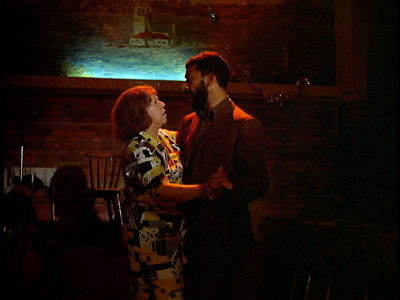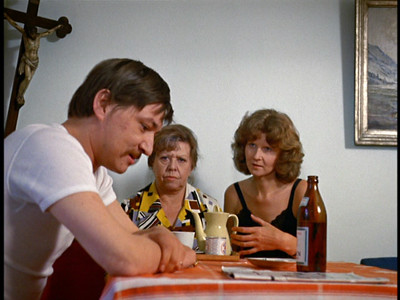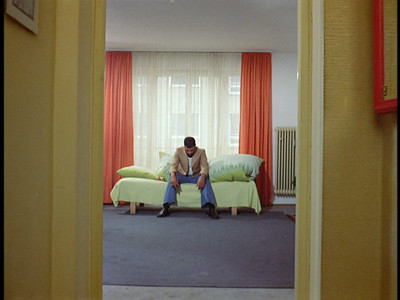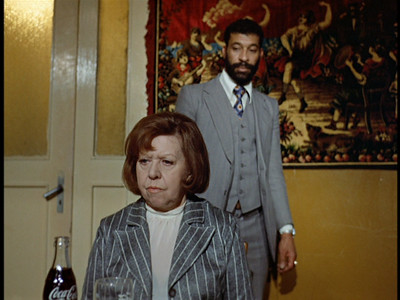
I've been meaning to watch Ali: Fear Eats the Soul since I reviewed Magnificent Obsession last month. Rainer Werner Fassbinder was probably Douglas Sirk's most fervent and notorious student, and Ali one of the films where the German director distilled Sirk's melodrama into a more modern European landscape.
Emmi (Brigitte Mira) merely wanted to get in out of the rain when she ducked into the Asphalt Bar, but she got much more then she bargained for. Taunted by a snotty woman whose advances he had rejected, Ali (El Hedi Ben Salem) asks Emmi to dance. The fifty-something cleaning lady obliges, and a love affair begins. The Asphalt is a hangout for Arab immigrants, and it's a completely different world than the one that Emmi takes Ali back to when he walks her to her apartment. Yet, he stays overnight and never leaves. The two eventually get married, a union that brings them as much grief as it does happiness. 1970s Germany, like many places, was not a place where interracial marriages were common, and with twenty years or more separating Emmi and Ali, it's like one taboo has been grafted onto another to make a whole new taboo entirely.

The plot takes the familiar Sirkian dilemma and twists it in a new direction. Changing social mores allowed Fassbinder to get away with a political and emotional scenario the Hollywood codes of the 1950s would never have let Sirk deal with. It's a trick director Todd Haynes, who recorded a video introduction for this DVD, would borrow thirty years later for Far From Heaven
It is possible for an homage to be too much of an homage, and Fassbinder veers dangerously close to that edge. The plot of Ali: Fear East the Soul is wafer thin, and at times the writer/director piles on the heavy emotions to the point of overload. While the fantastic color scheme of the movie, utilizing solid blocks of garish color to suggest the characters are trying to dress life up in a happiness they don't really possess, calls to mind Sirk's 1950s pastels, other fumblings with the Sirk toolbox have the faint odor of postmodern irony, as if Fassbinder is slightly above the concerns he chronicles. The gossipy hens who live in Emmi's building, for instance, seem plucked right out of an old television show, and Fassbinder's own turn as the lazy German husband who hates the Turks and Arabs stealing his job just needs a beer stain on its wife-beater T-shirt to make the caricature complete. Fassbinder is just one of the many stiff actors to appear in Ali. The mechanical step-turn-look blocking is more like a Bresson-directed non-performance than the quiet operatics Sirk peddled in.

I guess I can't really say I know what 1970s Germany was actually like, but much of the racism struck me as overwrought and even a tad cartoony. Emmi is ostracized, given the most scowly dirty scowls, and her friends are more than open with their polemics and urban legends about the habits of black men. Yet, race also provides some of the more interesting elements of the larger story. Emmi herself is rather cavalier about mentioning having belonged to the Nazi party or taking Ali to one of Hitler's favorite restaurants for dinner after their marriage ceremony. She carries within herself an underlying racism that Fassbinder saw in Germany, a hypocrisy of a supposedly enlightened present that has not really eradicated the sins of the past, just repositioned them. Emmi has never had to confront her own feelings about race, and loneliness is not a convenient enough excuse to fully erase deeper prejudice.
The movie actually improves in its third act when Emmi's friends, family, and neighbors adjust to her new husband. Now that Emmi doesn't have to deal with their scorn, she begins to objectify Ali and show him off. There was always a kind of motherly element to their relationship that sometimes garners some unintentional laughs, as if Fassbinder had accidentally spliced a little Harold and Maude

The phrase "fear eats the soul" is a Moroccan saying that Ali teaches Emmi, and it describes the overall problem the two face. They let the worries of the outside world distract them from the interior and private life that nourishes them. Fassbinder also plays it a little on the nose by giving Ali a physical ailment that is literally eating away at his insides, but that seems more shoehorned in for an enhanced dramatic finale than an embedded part of the movie. It does, however, allow him to make it just about Ali and Emmi again, which is where the film should end up anyway. In spite of this, in his last distortion of the Sirk approach, Fassbinder unleashes a cynicism that is inherent in his work and is probably the source for some of those writing problems I complained about earlier. Rather than a great romantic surge to close out the picture, Fassbinder sticks to something more bittersweet. The lovers may be reunited, but the problems that divided them are incurable and cyclical. The fear can never be fully done away with, and it's always hungry.
Rainer Werner Fassbinder may be in love with the great romantic artistry of Douglas Sirk, but that doesn't mean love is something he can believe in himself. I guess that's the difference between wanting to be Douglas Sirk and actually being him.


1 comment:
“Ali: Fear Eats the Soul” by Rainer Werner Fassbinder provides an elaborate analysis of human proneness for ethnic prejudices. Fassbinder himself plays the role of a right wing lout who needs prejudices to aggrandize himself in order to feel he is worthy part of a greatest nation (Germany) and a greatest political system (Democracy). Fassbinder’s protagonist is poor, uneducated in liberal arts and doesn’t have any particular achievements. For him to feel superior over other people is the only way to feel himself as somebody, to have self-respect and be proud of his existence. Special attention Fassbinder pays to the analysis of two aspects of any ethnic prejudice: directly hateful (repressive), and with an economic face (exploitative), and how each of them injures in its own way the soul of its victims. Also Fassbinder focuses on people’s unconscious use of human sexuality as a compensation for psychological trauma as a result of non-recognition of a common humanity in individuals and groups targeted by ethnic prejudices. The analysis of the relationships between Ali and Emmy and between Ali and a bar owner gives Fassbinder an opportunity to represent two kinds of love between a man and a woman: love based on psychological wholeness with a sexual component, and love based on the emotional need to have a sexual relationship as a compensation for a lack of social or personal non- or under-recognition. Contrary to the opinion of many critics, “Ali” is not a weepy but a serious research by the way of ascetic dramatization into common psychological roots of xenophobia in social and personal relations. Please, visit: www.actingoutpolitics.com - to read essays about films by Godard, Bunuel, Bergman, Bresson, Resnais, Kurosawa, Pasolini, Alain Tanner, Bertolucci and Cavani (with analysis of shots from the films).
Post a Comment